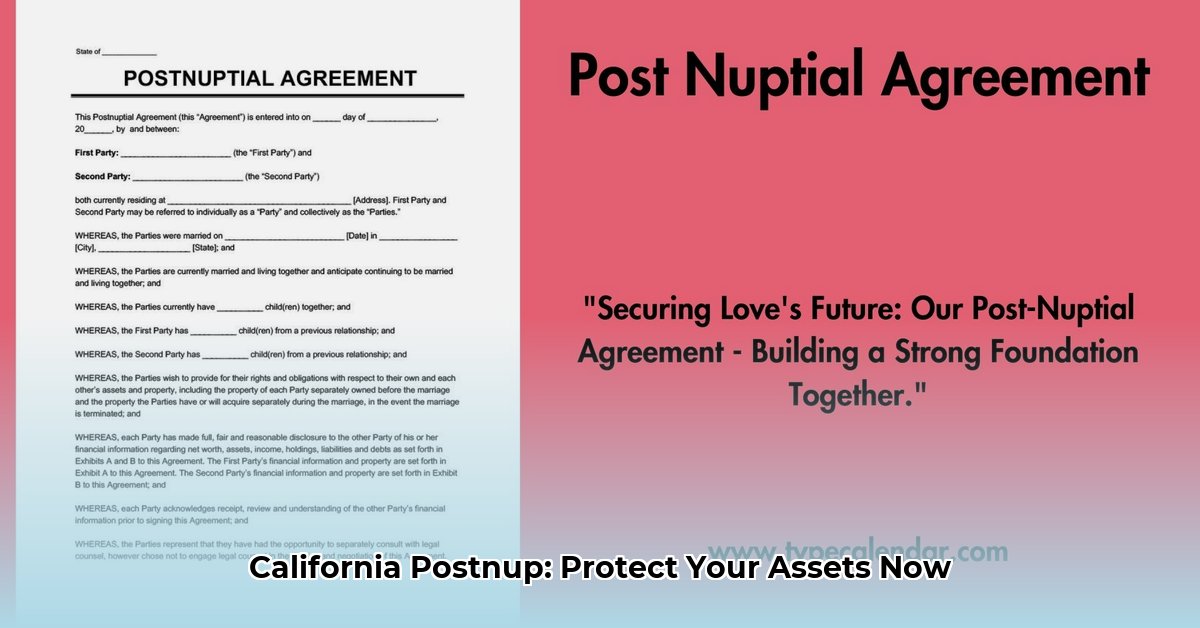
Understanding California Postnuptial Agreements
Divorce can be financially devastating. A California postnuptial agreement, a contract created after marriage, provides a crucial safety net, protecting both spouses' assets should the relationship end. This guide offers clear, actionable steps to help you navigate the process and create a legally sound agreement. Protecting your financial future requires careful planning and understanding of the legal requirements.
What is a Postnuptial Agreement in California?
Unlike a prenuptial agreement (signed before marriage), a postnuptial agreement is a legally binding document created after the wedding ceremony. It details how assets will be divided in case of separation or divorce. This proactive approach minimizes future conflict and protects both parties' financial well-being. It's a critical tool to manage the complex financial landscape of modern marriages.
What to Include in Your California Postnuptial Agreement
A comprehensive postnuptial agreement includes several essential components:
- Detailed Asset Inventory: A complete listing of all assets (real estate, bank accounts, investments, businesses, debts) belonging to each spouse, both individually and jointly acquired. Accurate valuation is crucial.
- Spousal Support (Alimony) Provisions: Clearly define whether spousal support will be paid, the amount, duration, and conditions for payment.
- Property Division: Specify how community property (acquired during the marriage) and separate property (owned before marriage) will be divided. California is a community property state but the postnup can modify this.
- Debt Allocation: Clearly assign responsibility for existing debts, detailing repayment plans and methods.
Legal Requirements for a Valid Postnuptial Agreement
For your agreement to be legally binding, California law mandates several key requirements:
- Fairness and Voluntariness: Both spouses must enter into the agreement freely, without coercion or undue influence. An agreement perceived as unfair may be challenged in court. Independent legal counsel is strongly recommended.
- Full Disclosure: Complete and honest disclosure of all assets and liabilities is paramount. Omission or misrepresentation can invalidate the agreement, as illustrated by the landmark In re Marriage of McCourt case.
- Proper Execution: The agreement must be in writing, signed by both parties, and typically notarized. This ensures legal authenticity and enforceability.
Common Challenges and Pitfalls to Avoid
Several common issues can undermine the validity of a postnuptial agreement:
- Ambiguous Language: Vague or unclear wording can lead to disputes. Precise legal language is essential.
- Incomplete Disclosure: Failing to disclose assets or liabilities, intentionally or unintentionally, can be grounds for invalidation. Total transparency is critical.
- Coercion or Undue Influence: Pressure or manipulation during the negotiation process can render the agreement unenforceable.
Preparing for the Postnuptial Agreement Process
Before creating your agreement, take these crucial steps:
- Gather Financial Documents: Compile all bank statements, tax returns, property deeds, investment records, and any other relevant financial documentation.
- Consult with Attorneys: Both spouses should independently consult with experienced family law attorneys specializing in postnuptial agreements. This ensures representation of individual interests and protects against future disputes.
Choosing the Right Attorney
Selecting the right legal representation is critical. Look for an attorney with:
- Extensive experience in California family law and postnuptial agreements.
- A proven track record of success.
- Excellent communication skills and a clear understanding of your specific financial situation.
Frequently Asked Questions (FAQ)
- Q: Can I modify my postnuptial agreement later? A: Yes, but it generally requires mutual agreement or court approval, often necessitating further legal action.
- Q: What if my financial situation changes significantly after signing? A: Substantial changes could warrant reviewing and potentially amending the agreement. Consulting your attorney is strongly advised.
Conclusion: Protecting Your Future
A well-drafted postnuptial agreement provides significant financial protection for both spouses. By understanding the key legal requirements, avoiding common pitfalls, and seeking expert legal counsel, you can create a document that safeguards your assets and provides peace of mind. Remember, this is a crucial step in planning for a secure financial future.